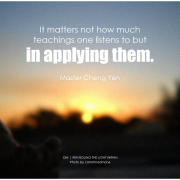A 10 Point Financial Survival Guide for Your 20s
It’s been said time and time again that we Millennials don’t appreciate the value of hard work. That we’re good for nothing deadbeats who don’t have any goals or ambitions.
If I felt that were true, then I wouldn’t have started New Inceptions. However, I know that there are many of us who are doing great things, but due to our focus on those great things, we start losing perspective in other areas of our life.
One of the things I believe that many of us don’t get the chance to focus on is finances. I know I didn’t know how to handle most of my finances until after my mom passed. It was because I suddenly had my inheritance that I was like “whoa, I need to figure out what I’m to do with these funds!”
So, now that it’s been a few years of managing assets, I feel that I should share with you some of the things that I did that have helped me keep above water.
Things I wish I would have Done in My 20s
1. Educate myself more about how long term investing works with day to day expenses. You know, I talk all the time about how I started paying attention to finances when I was in high school. And later in my early 20’s, I read Rich Dad Poor Dad series of books. But the truth is, the stuff I learned about finances is so out there from your day to day issues, that I started living for the future and not really paying attention to money planning that would benefit me in the nearer term.
For example, until 2011, I had no idea what IRAs (Roth or traditional), mutual funds, and annuities were or how they worked. I had no idea what index funds were and why I might like those more than mutual funds. No idea. I had no idea what I could be taxed on until I was actually taxed on it. Common Stock vs Preferred Stock? Distributions? Not a clue.
However, I have found some resources that have helped me get a better grip on where I am and what I’m looking to do, and I believe you’d get plenty out of them yourself.
Radio and TV:
- Dave Ramsey Show (Start here if possible! Kinda all over the board.)
- Suze Orman (She can be pretty truthful at times. However, you can tell she has passion!)
Blogs:
Books:
- Money – Master the Game: 7 Steps to Financial Freedom – Tony Robbins (Basic Money Defining and Tactics)
- Why We Want You To Be Rich – Donald Trump and Robert Kiyosaki (2006 book that talks about how they predicted there would be a shrinking middle class and that you could either not be financially educated and start sinking or get educated and become part of the rich)
- Total Money Makeover – Dave Ramsey (a little more focused strategy from Dave)
- The Richest Man in Babylon by George Clason (picked this one up from Vern Dahlstrom in my graduate days at Purdue)
2. Build a Line of Credit
If you’re worried about taking on debt as a 20 something, that’s fine. Especially if you’re in college and don’t have a way to pay pack a huge debt that you can easily rack up on credit cards. That said, you need to realize that eventually you’re going to probably want to get a mortgage for a house. Let me tell you this can be a problem, even if you’re willing to put in 50% of the down payment. Any credit card will do nicely for this. Personally, I recommend something with a $1000 limit so that you don’t get tempted to use money that’s not yours on that new TV or wardrobe.
3. Start Tracking My Credit Score
If you’re going to start a credit card, you need to keep track of your credit score. The easiest way I’ve found to do this is by using a free service, but many times you’ll find out that they somehow start charging you on a monthly basis if they ask for a credit card or bank account. The best way to do that is through one of the three credit bureaus such as Equifax.
4. Start Watching My Identity
There are tons of ways that a person’s identity could be stolen today. So when you do use a card, you should probably figure out a way to put monitors up for your own piece of mind. Personally, I have two subscriptions. I use LifeLock AND Equifax to monitor my identity. I would think that LifeLock is good enough (there’s different plans available – I think mine is $100 a year?), but Equifax and the other credit bureaus have the ability to actually do something about your credit while LifeLock just monitors.
Even if you don’t get a service like LifeLock, I recommend checking your credit score at least once a year.
5. Start a retirement account.
Many people think that the word retirement refers to an age. To me, retirement doesn’t take an age. It takes an amount of money. It is the point where you no longer have to work to support yourself. Am I to that point? No. I don’t know if I ever will be. However, that doesn’t keep me from investing. The sooner, the better. In Tony Robbins book, he says, “You have to commit a certain percentage of your income to savings for your financial freedom. Whatever that number is — 10%, 15% — stick to it in good times and bad. Have it taken automatically from your paycheck and put directly into a retirement or savings account.” He says that if start doing this from your 30’s or especially your 20’s, you’ll live comfortably just as you hit your mid 50s.
In other words, it’s better to own a piece of Apple then it is to own the newest Apple phone. Personally for me, as I’m writing this, the one stock I do have is in Tesla and currently it’s up from where I bought it at $189/share to roughly $280/share. I also have a couple annuities, a mutual fund, and ownership in a couple of businesses, and some other odds and ends. Make money work for you sooner than later.
6. Start an emergency fund.
Even if you happen to strike it rich in your 20’s through your first job, you need to save some of that money. Always pay yourself first. Yes, I’d recommend starting to invest some of that, but you also need to keep some of it relatively free just in case. I mean, let’s face it – stuff happens! Instead of taking on more debt to pay for an accident with your car or first house, you’ll be able to pull from this emergency fund. I’d say make it a goal to set aside $1000 as a good starter amount. As you get older, you can increase it to better suit your needs.
7. Make a Plan to pay off Student Loans.
Currently, most of us who go to college do so partially thanks to Fannie Mae and friends. So make it a goal to start eating this elephant one bite at a time as soon as you get the previous items knocked out. First and foremost, get to the ones that have variable interest rates. You never know when the government will jack these up. After than, start looking at your federally backed loans. While the smaller per month payments might sound more manageable, in the long run you’re actually paying more through the interest. If you’re single and working, now’s a great a time as any to get started on repaying your loans. Get them knocked out before you start trying to do anything else in life such as starting a family or buying a house. I’d recommend using 10% of your paycheck towards paying them off.
8. Hustle Everyday (or at least every other day)
I was just listening to a podcast of Lewis Howe’s where he interviewed Kimberly Guilfoyle. Besides the fact that she’s a ball of fire (and if you listen to the interview, it’s easy to see why), she also has hustled most of her life. I mean, wow. Her track record is totally impressive. One part of the interview that stuck with me was when she was talking about when she was in school that she not only was a full time student getting a 4.0, she was also doing an internship at the local DA AND was manager in retail. I mean, that’s like… super hard. Being a student getting good grades was hard enough, let alone adding two other completely different roles on top of that!
Obviously, this shows that she hustled. She didn’t want to have loans when she was done. But it’s not like she did anything special. You can have her results too. Maybe instead of taking a non-paying internship, you can pick up something part time? Or if you already do work part time, perhaps you can pick something else up? Maybe be a tutor if you’re a upperclassman? Or if you’ve already graduated and are working in your first job, maybe the best thing you could do is start your first official business?
The point is, don’t put all your eggs in one basket. You never know what’s going to fall out the bottom.
9. Become a Picker
One of my favorite shows that I’ve been watching for a few years now is American Pickers. I started watching because of the old junk that they found and found value in – I inherited plenty and have a curiosity about it. Anymore, however, I’ve been watching to see how they start their negotiating with the people that they buy from. If you think about it, negotiation is something that those who are highly successful in business deals know how to do. Also, if you’re familiar with the movie Erin Brokovich, you’ll remember this clip. Needless to say, if you can learn to make a strong case to get something you desire, you’ll have the world by the horns.
10. Set Long Term Goals
Even though I read Rich Dad Poor Dad in my early college years, I never truly set any goals from reading it. I think if I had, I would probably be in a different financial situation than I am now. I’ve recently come to the conclusion that when it comes to goals, you definitely need a destination. However, I don’t know if the steps are nearly as important as everyone eludes to. If you don’t take part in the journey, it doesn’t matter where your destination is, you’ll never get there. Right?
If this is the case, it makes sense that we should be able to vividly describe what our ideal goals are. Where are you? Who are you with? What are you doing? These are all things that I think you should think about as you’re on your journey. That end might change a little here and there, but you’ll be much better off for doing it than if you had not.
Whatever your goals are, write them down and start working on them asap.








